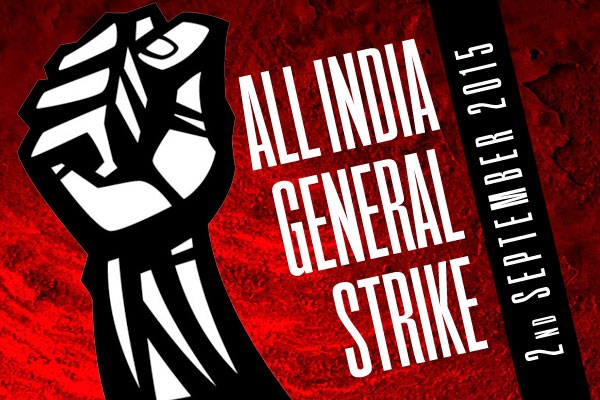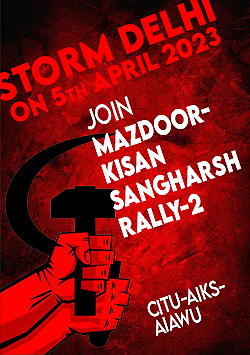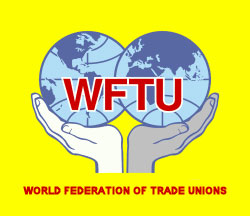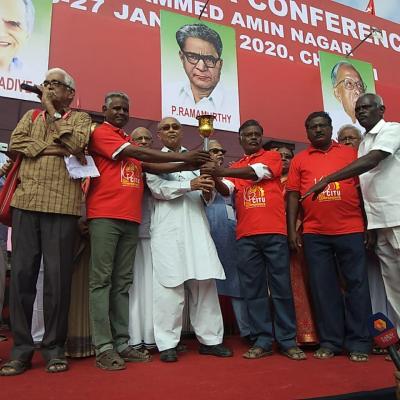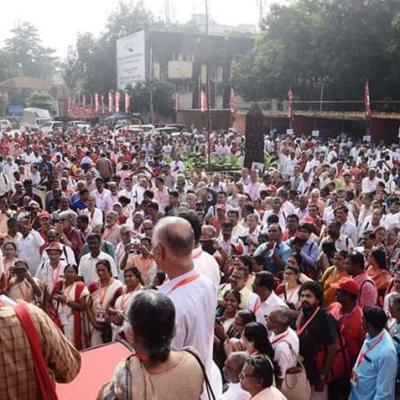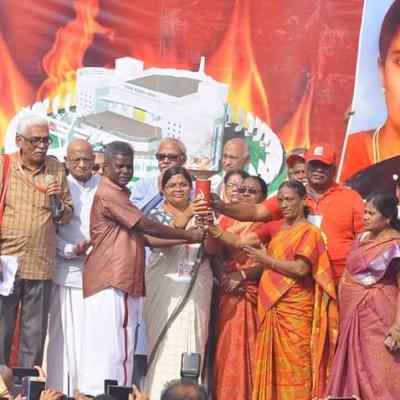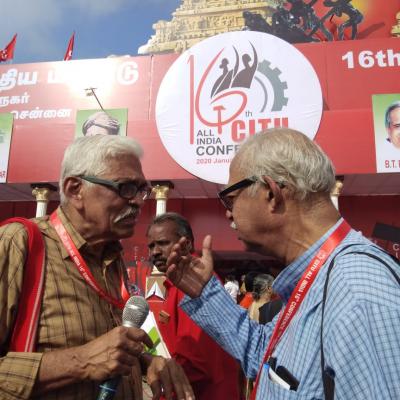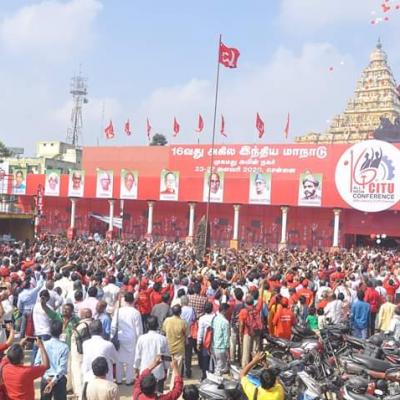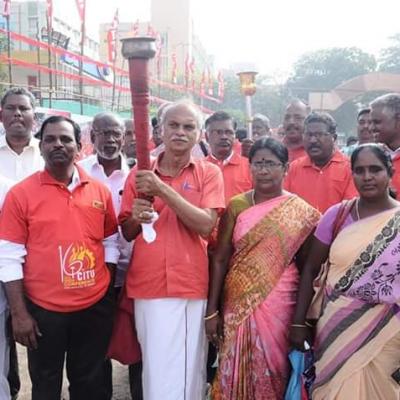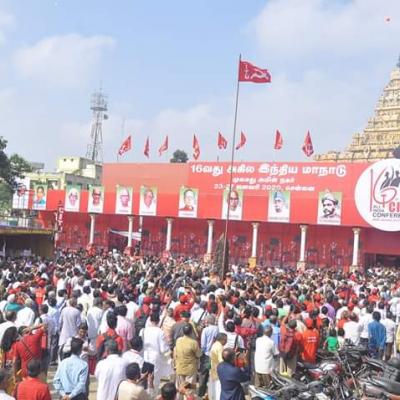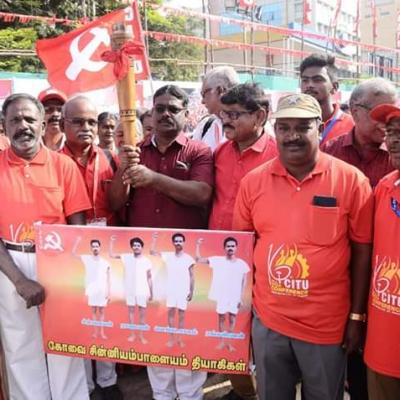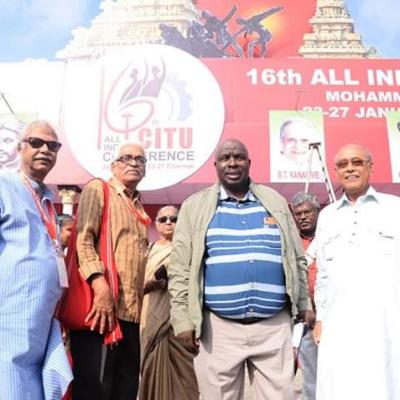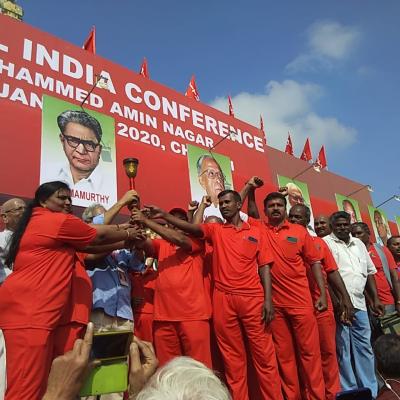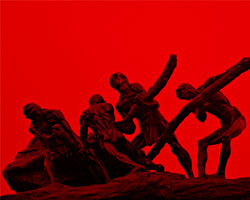All India General Strike, 2nd September 2015
Millions of workers have so far participated in the preparatory meetings and rallies in support of the nationwide General Strike on 2nd September 2015, called by the Platform of Central Trade Unions and National Federations of Employees. The unprecedented support from the workers shows the urge for changing the current economic policies that have put the workers and peasants into tremendous crisis. The united platform of the trade unions consists of 11 central trade unions viz. BMS, INTUC, AITUC, HMS, CITU, AIUTUC, TUCC, SEWA, AICCTU, UTUC, LPF and All India Federations of Banks, Insurance, Defense, Telecom, Central/State Government Employees and other Service Establishments. A National convention of these organisations held on 26 May 2015 had given the call for General Strike on 2nd September 2015. The trade unions have served a demand notice to the Centre and States Governments that consists a 12-point Charter of demands which includes the following:
1. Urgent measures for containing price-rise through universalisation of Public Distribution System and banning speculative trade in commodity market.
2. Containing unemployment through concrete measures for employment generation.
3. Strict enforcement of all basic labour laws without any exception or exemption and stringent punitive measures for violation of labour laws.
4. Universal social security cover for all workers.
5. Minimum wages of not less than Rs 15,000/- per month with provisions of indexation.
6. Assured enhanced pension not less than Rs.3,000/- p.m. for the entire working population.
7. Stoppage of disinvestment in Central/State PSUs.
8. Stoppage of contractual work in permanent perennial work and payment of same wage and benefits for contract workers as regular workers for same and similar work.
9. Removal of all ceilings on payment and eligibility of bonus and provident fund; increase the quantum of gratuity.
10. Compulsory registration of trade unions within a period of 45 days from the date of submitting application and immediate ratification of ILO Conventions C 87 and C 98.
11. Stoppage of Pro Employer Labour Law Amendments.
12. Stoppage of FDI in Railways, Insurance and Defense.
In addition to these the central trade unions are also demanding the withdrawal of the Land Acquisition amendment ordinance.
This charter of demands has got support not only from farmers but also youth and students of the country. The main concern of the trade unions are the drastic changes the Central and several State Governments intending to bring to the labour laws, including the Industrial Disputes Act. These labour law amendments whether by the government of India or by different state governments led by the BJP ruled Rajasthan government or Madhya Pradesh government, are aimed at empowering the employers to ‘hire and fire’ workers at their sweet will. They enable the employers to declare closures/ shut downs and retrench/lay off workers as well as to resort to mass scale conctractualization. They would push more than seventy percent of the industrial establishments in the country and their workers out of the purview of almost all labour laws.
All the Central Trade Unions have convened their national level meetings and chalked out programmes for independent and joint campaigns. All the Central Trade Unions have also held their own organizational meetings at state level. Those initiatives have resulted in successful holdings of the state level and sectoral conventions of all the Trade Unions and Federations. Starting from West Bengal, all the states have organized joint Conventions and adopted resolutions calling upon the unions and federations in the state to join the countrywide strike. National leaders of Central Trade Unions have attended these conventions, raising enthusiasm among the delegates participating. An important development in these conventions is the participation of state level organizations, mostly guided by the regional political parties. These organizations include the Trade Union wings or guided organizations of Shiv Sena, Telengana Rajya Samithi, Telugudesam, MDMK, DMDK and VCK in Tamilnadu, JMM in Jharkhand. In Kerala all the regional trade unions including those attached to ruling parties in the state have been participating in the countrywide strikes conducted after 2009. There are also organizations at state level, not attached to any political parties, but led by individuals or functioning as independent organizations like Working Peoples Council in Tamilnadu, which are also participating in the strike. State level conventions of the trade unions have been completed in all the states. Joint meetings and conventions were held in different sectors both organised and unorganised – Public sector units, Coal, Petroleum, Steel, Port and Dock, Road Transport, Electricity, Defense, Banking, Insurance, Telecom, State and Central Governemnt employees, Scheme workers, Construction workers etc. were held. Strike notices - union wise as well as joint are given in different sectors from 14- 18 August. Our farmers and agricultural workers are on the path of suicides, not able to withstand the blood sucking policies of the ruling class. Various sections of farmers and agricultural workers are already on struggle. The distress the Indian villages are facing is the result of the inhuman and exploitative policies being pursued by the rulers. It is for the working class of the country to be in the forefront of struggles against these policies and give confidence to all other sections of toiling masses in their struggles. The solidarity of all sections of toilers has to be strengthened. The unity of the Trade Unions on the basis of an agreed charter and the struggles being conducted have to be developed into a massive struggle against the anti-people, neo-liberal policies.
The countrywide General strike on 2nd September, should mark the beginning of a new phase of struggle. This one day general strike will turn into a massive action to warn the ruling class against their policies. We should force a change in the policy trajectory of the country and working people should move towards that as a united force.
Issued by
Centre of Indian Trade Unions (CITU)








